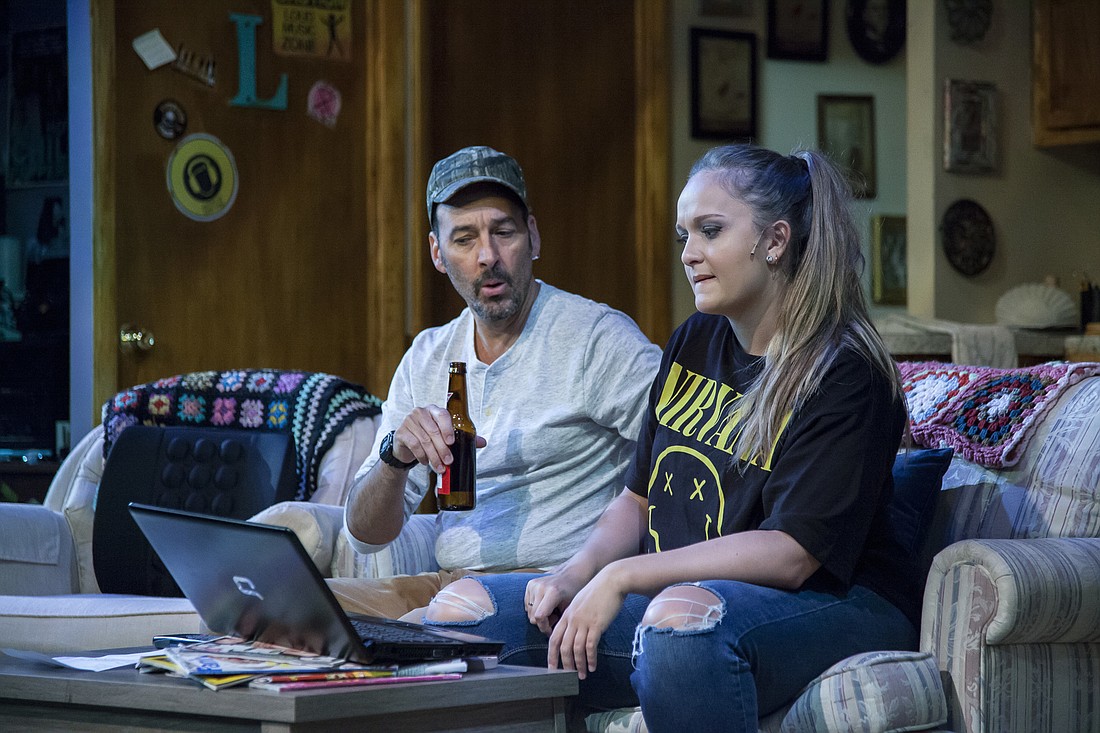- January 3, 2025
-
-
Loading

Loading

Stephen Spotswood’s “Doublewide” tells the story of an American dream deferred at Florida Studio Theatre. It’s premiering simultaneously at FST and other theaters in a “rolling premiere.”
This brand new play revolves around the Starkeys, a family of working class heroes. Their struggles are both heroic and mundane.
“Big” Jim (Todd Licea) is a good-natured worker at a soda factory. The pay’s not bad—and it’s not that good. His wife, Sharon (Gisela Chipe), works at a Walmart. Years of slouching over a cash register have given her a bad back. They’re both stuck in their jobs. Their daughter, Lorelai (Alexa Fajardo Eldridge), has a year to go in high school. She’s a smart kid who dreams of being a music producer. But she’s working two jobs, and odds are she’ll drop out before that dream is in reach. Charlie (Nick Piacente), an earnest tutor from an upper class family, is trying to get her grades up—in a mix of altruistic and carnal motives. His partly good intentions aren’t good enough.
Good people in a bad situation. Who seem to be stuck there.
But they don’t want to stay that way.
The “Doublewide” of the title embodies the Starkeys’ frustrations.
The family lives in a deteriorating, shabby, doublewide prefab structure, built from ersatz, substandard materials. It’s a house, but in no way a home. The family shares a simple dream: replacing it with a real home that’s built to last. They own the land beneath it, after all. But a powerful, indifferent force is holding them down. The exploitive casino just down the road.
This unseen enemy turns their lives upside down.
Day after day, their grandmother, Coral (Kim Crow), is gambling her meager pension away. Worse than that, the casino’s so popular, it’s filling the highway in front of their property with traffic. With the collusion of county officials and the power of eminent domain, the casino plans to widen that road. That would make the Starkeys’ dream of building a permanent house on their land impossible.
Jim fights back with a passionate letter to the local newspaper. Charlie and Lorelai seem to be hitting it off. Sharon just might get a better job. The play looks like it’s on the way to an unrealistic happy ending. They might win after all! Or the house might win.
Either way, the playwright’s more interested in realistic character portraits of decent people playing a rigged game. His play has a few predictable turns. But it frequently swerves from the ruts of expectations. (Being specific would spoil the jokes; but the formula-busting jokes are there.)
Jason Cannon’s direction makes the most of Spotswood’s unpredictable comedy—without glossing over the play’s gritty truths.
Licea’s portrayal of “Big” Jim nicely captures a good-hearted, good old boy who doesn’t fit the PC mold. Chipe’s Sharon soldiers on and makes tough decisions when she has to. Eldridge makes for a great, sullen teenager—with depths beyond the generic caricature. Crow’s grandmother puts in a very funny portrait of a character who’s basically an addict. Piacente’s Charlie is a real nice guy. Up to a certain point.
Isabel and Moriah Curley-Clay create the perfect setting of their struggles. A perfectly horrible entropy sink of press-wood and Formica.
It all adds up to a moving story. For most upper middle class theatergoers the story is second-hand. That’s how it goes these days.
We live in a world where most of us live in separate worlds—right, left, rich, poor, black, white ad infinitum. The struggles of working class heroes are remote to those outside their world. Spotswood’s play does what good theater should. He takes you do a different world. He puts you in the Starkeys’ shoes and makes you feel what they feel.
“Doublewide” literally brings their struggles home.